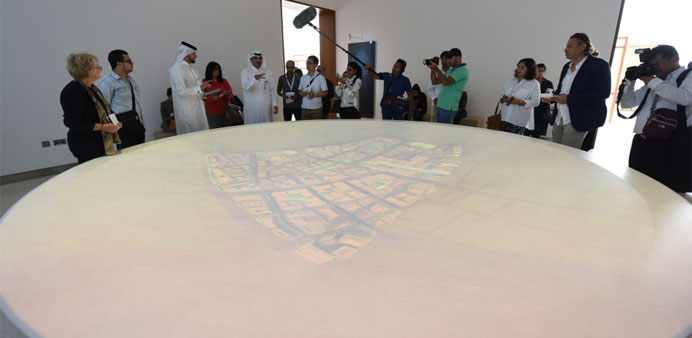By Joey Aguilar/Staff Reporter
Msheireb Museums are giving more emphasis on oral history by using state-of-the-art technology than artifacts, a senior official has said.
"We want to share the stories and memories to Qatar’s residents, especially to the youth," Msheireb Museums manager Hafiz Ali Ali explained during a media tour of the four museums yesterday.
“We do not focus too much on artifacts, the focus is on stories and the memories of the past,” he said. “This is what we need to tell the new generation.”
The Mohamed Bin Jassim House uses the latest technology in storing and playing videos and films, audios and photos such as interactive tables and “memory books (touch pads).”
Built by Sheikh Mohamed Bin Jassim al-Thani, son of the founder of modern Qatar, the museum showcases the transformation of Msheireb overtime.
Visitors will have the chance to hear some of the stories and testimonies of former residents of Msheireb, the home to Qatar’s first hotel, first bank, first pharmacy and first cafes.
“We encourage students from different schools in the country to come and do research about their past,” Ali said. “The kids can come and interact and see what our ancestors did.”
Some of the museums have a special room for filming people’s stories and their experiences live using a wide touch screen. Msheireb Museums also hired a staff who specialises in oral history to help document other accounts.
“When they have some stories to share, they can come to these rooms and update us about their stories, their experiences, and their families,” Ali said.
The interactive tables at the Mohamed Bin Jassim House also tell the architectural process and the materials used to design Msheireb Downtown Doha, considered as the first sustainable project in Doha.
Museum visitors can use interactive panels to see how water can be conserved in the community, how to recycle waste and how to save electricity since a huge amount of energy is usually consumed, among others.
Ali noted that it was their first time to use this kind of technology in Qatar which is helpful for students.
To raise awareness on the global abolition of human exploitation, the Bin Jelmood House has rooms where films and videos old and modern slavery can be watched.
The museum is where stories of the origins, capture, transportation and daily tasks of the people who served in bondage can be followed. It also provides space for reflection on the story of slavery and how it has evolved into modern forms of human exploitation.
At a state-of-the-art cinema in the Company House, visitors will be able to know first hand accounts of men who sacrificed and laboured to build the oil rigs in Dukhan.
Visitors can also touch the artifacts and items displayed in the museum, according to Ali.
“We want the people to touch and feel the item that was brought here. For us it is good for educational programme,” he added.

